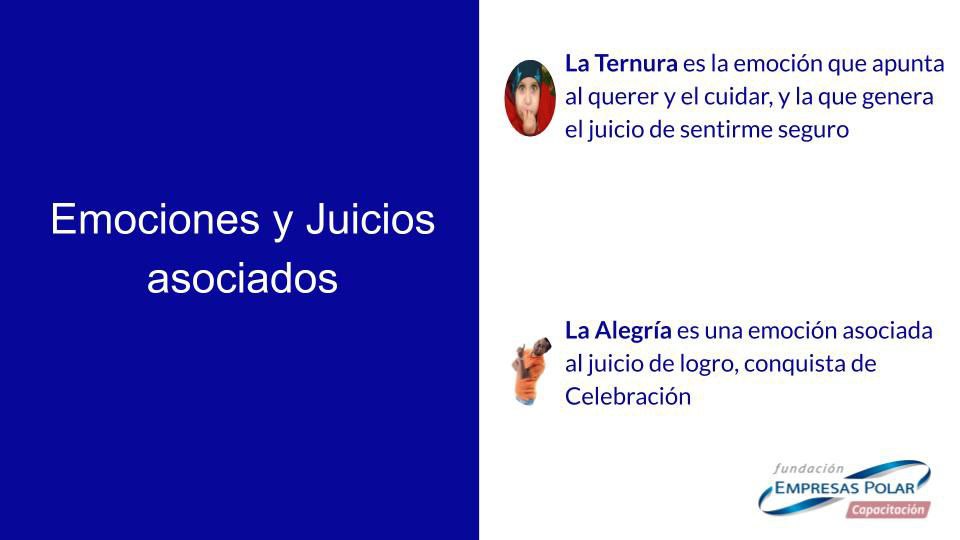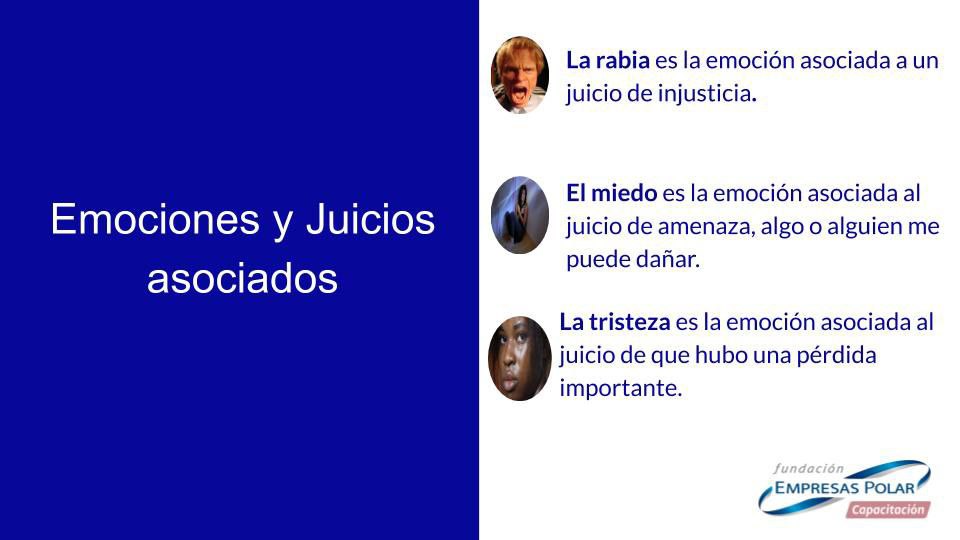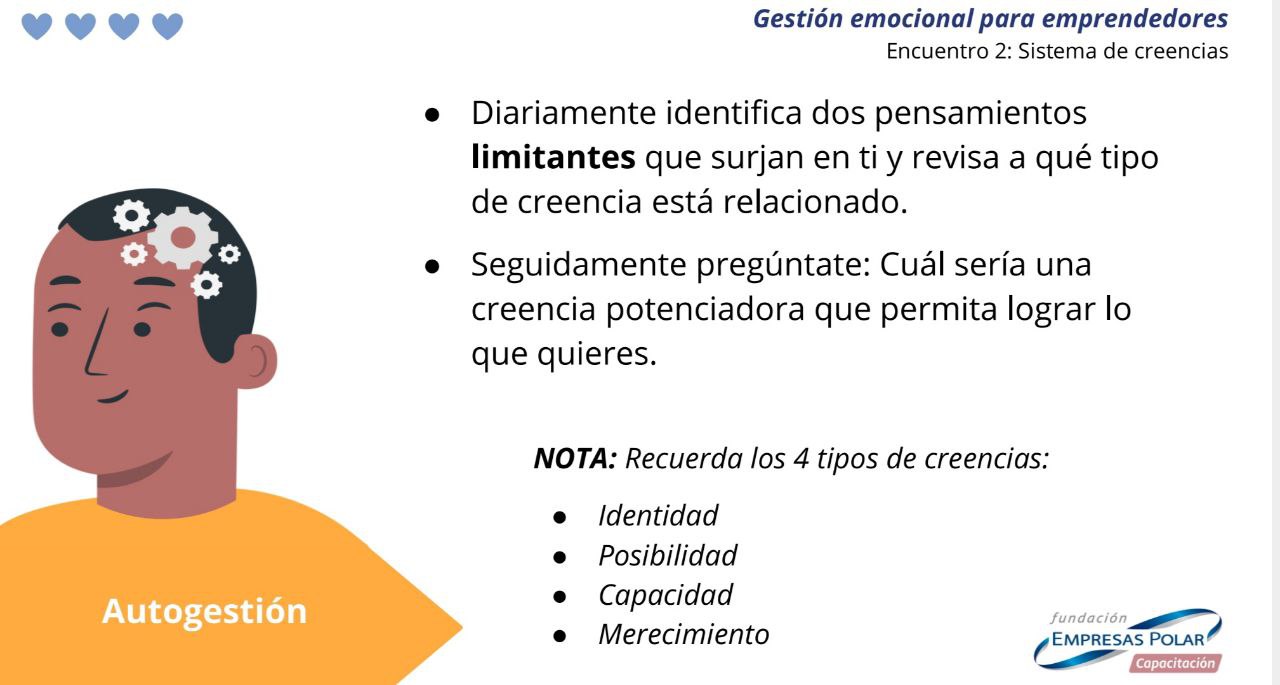Capacitación de Fundación Empresas Polar
Saludos a todos los emprendedores que hacen vida en @beentrepreneur , hoy deseo compartir mi experiencia y lo que aprendí en este nuevo curso sobre gestión emocional orientado específicamente para aquellas personas que tienen un emprendimiento o están en el desarrollo del mismo; sin embargo, el tema de las emociones se aplica en cualquier entorno y situación sean emprendedores o no.
Cada vez que comienzo un curso me llenó de emoción y expectativas, y durante el curso estas expectativas son satisfechas porque los profesores son profesionales capacitados que representan muy bien a las empresas Polar una prestigiosa industria Venezolana, estos cursos también tienen el aval de la Universidad Central de Venezuela una de las mejores del mundo.
Siempre se inicia los cursos con preguntas generadoras y reflexivas, te invito hacer este ejercicio mientras lees mi post.
¿Cuáles son las emociones que identificas en ti y que experimentas con más recurrencia desde tu rol de emprendedor?
Reconocer nuestras emociones es fundamental para su adecuado manejo y administración, por eso es necesario saber que emociones tengo con regularidad, que las causa y cómo las manejo, además de saber como esas emociones afectan mi rol de emprendedor.
Las emociones que yo reconocí son: miedo, inseguridad, emoción, motivación e incertidumbre.
Un gran porcentaje de los participantes del curso reconocieron tener miedo e incertidumbre.
### ¿Qué es para ti el autoconocimiento?
 Imagen de Amy en Pixabay
Estas preguntas nos invitan a mirar hacia adentro, ver qué pensamos de nosotros mismos, y reconocer cómo reaccionamos a estímulos externos. Entre los primeros ejercicios recibimos un audio con una música instrumental todo el grupo debía describir las emociones que sentía, y las respuestas fueron diversas, algunos se sintieron melancólicos, con tristeza o incluso con ternura, las perspectivas son distintas porque somos seres únicos, somos seres interpretativos.
Para conocernos debemos observar nuestras emociones que muchas veces surgen de nuestros pensamientos porque están conectados, uno de los ejercicios de tarea era hacer un control de las emociones, agarrar una hoja y dividirla por la mitad con una línea y colocar en un lado los pensamientos y del otro la emoción asociada, tomar el tiempo de parar y observar qué estoy sintiendo en el ahora y registrarlo, de esta forma saber qué estaba pensando para sentirme así, este es el primer pasó para descubrirnos e ir anotando qué emociones sentimos con más regularidad y que la desencadena, este ejercicio se hace como mínimo por una semana 4 o 5 veces al día. Este es el primer paso para tener una gestión emocional.
Luego de identificar qué emociones tenemos y sus causas, es el momento de analizar los juicios asociados a esas emociones. Cada emoción tiene su sabiduría, cumple un rol y cada una nos prepara para actuar diferente.
Depende de nuestros pensamientos, se establece nuestro sistema de creencias, y son las creencias las que nos expanden o las que nos limitan y no nos dejan evolucionar.
 Origen Fundación Empresas Polar
 Origen Fundación Empresas Polar
### ¿Por qué es necesario revisar estas creencias?
Creo que hacerlo nos permite evaluar nuestra forma de pensar y actuar, de valorar si lo que pensamos es correcto y verdadero y si nos sirve para avanzar, crecer y superarnos.
Porque es una vía para reprogramarnos al identificar nuestras creencias. Categorizarlas o clasificarlas nos permitirá potenciar las buenas y transformar las malas.
Tipos de creencias
Creencia de identidad: tienen que ver con quién creo que yo soy, como me defino, son las creencias de lo que pienso sobre mí, por ejemplo soy flojo, soy impuntual, soy responsable. Estas creencias se descubren haciéndose preguntas asimismo.
Encontrarás creencias limitantes y potenciadoras.
En mi caso particular debo trabajar una creencia que cada día se reafirma más y es una gran limitante, la procrastinación. 🥹🥲
Creencias de posibilidad:
Son las opciones que nos hacen creer que algo es alcanzable o no es alcanzable, por ejemplo: no se puede ser emprendedor en Venezuela, no puedo emprender sin ningún socio.
Creencias de capacidad:
Son las creencias que tienen que ver, con lo que creemos que somos capaces de hacer o no. Nos limita a desarrollar proyectos porque creemos que no tenemos x o y capacidades, talento o fortaleza. Por ejemplo, no puedo llevar las finanzas de mi negocio porque a mí no se me dan los números.
Creencias de Merecimiento:
Estas creencias están muy relacionadas con la autoestima, y el autoconcepto, por ejemplo, cuando algo lo hacemos muy fácil y sentimos que no hay sacrificio, entonces creemos que no merecemos los méritos por el éxito de ese trabajo o proyecto.
El siguiente ejercicio fue muy esclarecedor para mí, me ayudó a explorar mis creencias y reprogramarme. Espero que sea de provecho para quien me lea y lo ponga en práctica.
Ejercicio para identificar las creencias
Identifica dos (2) creencias de cada tipo.
1. Una expansiva o habilitadora
2. Una limitante o restrictiva.
Estas son mis respuestas personales a este ejercicio. Te invito a tomarte un espacio en tu tiempo para realizar el mismo ejercicio.
Creencia de Identidad:
1. Una expansiva o habilitadora: Sincera, honesta.
2. Una limitante o restrictiva: Inconstante, procrastinadora.
Creencia de Posibilidad:
1. Una expansiva o habilitadora: Obtener un ingreso a través del internet, los productos digitales generan buenos ingresos.
2. Una limitante o restrictiva: Como emprendedora creer que existe mucha competencia en mi nicho y que no efectuaré venta.
Creencia de Capacidad
1. Una expansiva o habilitadora: Capacidad de riesgo, capacidad de adaptación
2. Una limitante o restrictiva: Inconstante, inseguridad
Creencia de Merecimiento
1. Una expansiva o habilitadora: Merezco ser exitosa en mis carreras porque me he capacitado en diversas áreas. Merezco generar ingresos fluidos a través de mi blog porque mi contenido aporta valor a quien lo lee.
2. Una limitante o restrictiva: No conocer mi cliente real para la elaboración de mi producto digital.
Luego de tener identificadas las creencias, explora el origen, de donde provienen, si vienen por influencia de nuestros padres, familia, amigos, profesores, entorno.
 Origen Fundación Empresas Polar
### ¿Para que me sirve identificar las creencias y categorizarlas?
Realiza el siguiente ejercicio con calma: una vez que te lleguen los pensamientos limitantes, trata de precisar a qué tipo de creencia pertenece, si es una creencia de identidad, de capacidad, de posibilidad o de merecimiento, después de que la categorizas piensa cuál pudiera ser la creencia contraria y la plateas, lo mejor es escribirla y desde ese momento hacer cosas que vayan de la mano de la nueva creencia, tomar acción para que se convierta en una realidad, en un hábito y así transformar tu realidad.
Este curso fue muy completo, hubo otros aspectos que se profundizaron, se trabajó sobre el miedo que es la emoción más paralizante para los emprendedores y se crearon declaraciones de confianza para afrontar nuestros temores.
Me despido esperando que sea de utilidad la información y los ejercicios que compartí y dejo esta pregunta para su análisis personal, no es necesario que la respondas, pero si gustas estaré encantada de leerte.
### ¿Qué crees de ti como emprendedor?
Training by Fundación Empresas Polar
Greetings to all entrepreneurs who are part of @beentrepreneur. Today, I would like to share my experience and what I learned in this new course on emotional management specifically designed for those who have a business or are in the process of developing one. However, the topic of emotions applies to any environment and situation, whether you are an entrepreneur or not.
Every time I start a course, I am filled with excitement and expectations, and during the course, these expectations are met because the teachers are trained professionals who represent Polar, a prestigious Venezuelan industry, very well. These courses are also endorsed by the Central University of Venezuela, one of the best in the world.
The courses always begin with thought-provoking questions. I invite you to do this exercise while reading my post.
What are the emotions that you identify in yourself and that you experience most frequently in your role as an entrepreneur?
Recognizing our emotions is essential for their proper management and administration, so it is necessary to know what emotions I have regularly, what causes them, and how I manage them, as well as how those emotions affect my role as an entrepreneur.
The emotions I recognized are: fear, insecurity, excitement, motivation, and uncertainty.
A large percentage of the course participants acknowledged feeling fear and uncertainty.
### What does self-awareness mean to you?
 Imagen de Amy en Pixabay
These questions invite us to look inward, see what we think of ourselves, and recognize how we react to external stimuli. Among the first exercises, we received an audio recording with instrumental music, and the whole group had to describe the emotions they felt. The responses were diverse; some felt melancholy, sadness, or even tenderness. Perspectives are different because we are unique beings; we are interpretive beings.
To get to know ourselves, we must observe our emotions, which often arise from our thoughts because they are connected. One of the homework exercises was to monitor our emotions, take a sheet of paper, divide it in half with a line, and write our thoughts on one side and the associated emotion on the other. We were to take the time to stop and observe what we were feeling in the present moment and record it, so that we could understand what we were thinking that made us feel that way. This is the first step in discovering ourselves and noting down which emotions we feel most regularly and what triggers them. This exercise is done at least four or five times a day for a week. This is the first step in emotional management.
After identifying what emotions we have and their causes, it is time to analyze the judgments associated with those emotions. Each emotion has its wisdom, fulfills a role, and prepares us to act differently.
Our belief system is established based on our thoughts, and it is our beliefs that expand us or limit us and prevent us from evolving.
 Origen Fundación Empresas Polar
 Origen Fundación Empresas Polar
### Why is it necessary to review these beliefs?
I believe that doing so allows us to evaluate our way of thinking and acting, to assess whether what we think is correct and true and whether it helps us to move forward, grow, and improve ourselves.
Because it is a way to reprogram ourselves by identifying our beliefs. Categorizing or classifying them will allow us to enhance the good ones and transform the bad ones.
Types of beliefs
Identity beliefs: these have to do with who I think I am, how I define myself; they are the beliefs I have about myself, for example, I am lazy, I am unpunctual, I am responsible. These beliefs are discovered by asking yourself questions.
You will find limiting and empowering beliefs.
In my particular case, I have to work on a belief that is becoming more and more entrenched every day and is a major limitation: procrastination. 🥹🥲
Beliefs about possibility:
These are the options that make us believe that something is achievable or unachievable, for example: you can't be an entrepreneur in Venezuela, I can't start a business without a partner.
Beliefs of ability:
These are beliefs that have to do with what we believe we are capable of doing or not doing. They limit us from developing projects because we believe we do not have x or y abilities, talent, or strength. For example, I cannot manage my business finances because I am not good with numbers.
Beliefs about deservingness:
These beliefs are closely related to self-esteem and self-concept. For example, when we do something very easily and feel that there is no sacrifice involved, we believe that we do not deserve the credit for the success of that work or project.
The following exercise was very enlightening for me; it helped me explore my beliefs and reprogram myself. I hope it will be useful for anyone who reads it and puts it into practice.
Exercise to identify beliefs
Identify two (2) beliefs of each type.
1. An expansive or enabling belief
2. A limiting or restrictive belief.
These are my personal answers to this exercise. I invite you to take some time to do the same exercise.
Identity Belief:
1. An expansive or enabling belief: Sincere, honest.
2. A limiting or restrictive belief: Inconsistent, procrastinator.
Belief in Possibility:
1. An expansive or enabling belief: Earning an income through the internet; digital products generate good income.
2. A limiting or restrictive belief: As an entrepreneur, believing that there is a lot of competition in my niche and that I will not make sales.
Belief in Capacity
1. Expansive or enabling: Risk-taking ability, adaptability
2. Limiting or restrictive: Inconsistent, insecure
Belief in Deservingness
1. Expansive or enabling: I deserve to be successful in my career because I have trained in various areas. I deserve to generate steady income through my blog because my content adds value to those who read it.
2. Limiting or restrictive: Not knowing my actual customer for the development of my digital product.
After identifying your beliefs, explore their origin, where they come from, whether they come from the influence of our parents, family, friends, teachers, or environment.
 Origen Fundación Empresas Polar
### Why is it useful to identify and categorize beliefs?
Take your time with the following exercise: once the limiting thoughts come to you, try to pinpoint what type of belief they belong to, whether it is a belief about identity, ability, possibility, or deservingness. After you categorize it, think about what the opposite belief might be and state it. It is best to write it down and from that moment on, do things that go hand in hand with the new belief, take action to make it a reality, a habit, and thus transform your reality.
This course was very comprehensive. Other aspects were explored in depth, such as fear, which is the most paralyzing emotion for entrepreneurs, and statements of confidence were created to help us face our fears.
I hope you find the information and exercises I have shared useful. I leave you with this question for your personal reflection. You don't have to answer it, but if you like, I would be delighted to read your thoughts.
### What do you think of yourself as an entrepreneur?
Posted Using INLEO